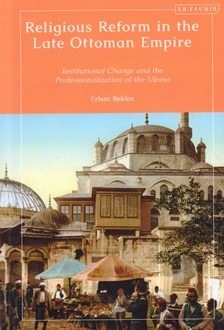Religious reform in the late Ottoman Empire : institutional change and the professionalisation of the ulema / Erhan Bektas.
Yer Numarası
A.IX/7205
ISBN
9780755645473 (HB)
9780755645480 (ePDF)
9780755645497 (eBook)
9780755645480 (ePDF)
9780755645497 (eBook)
Dil Kodu
İngilizce
Yazar
Basım Bildirimi
First edition.
Yayın Bilgisi
London : I.B. Tauris, 2023.
Fiziksel Niteleme
xvi, 215 sayfa : resim, grafik, şema, tıpkıbasım, tablo ; 24 cm
Genel Not
İndeks s. [209]-215.
Bibliyografi, vb. Notu
Bibliyografya s. [199]-208.
Bibliyografik notlar s. [165]-197.
Bibliyografik notlar s. [165]-197.
İçindekiler Notu
Preface -- Acknowledgments -- List of abbreviations -- Introduction : The decline paradigm of the Ulema Reconsidered -- The re-organization of the Şeyhülislam Office, 1826-1914 -- Ulema’s Educational Career -- Ulema’s professional career, 1880-1920 -- Social profile of the Ulema : a prosopographical study -- Ulema in the context of everyday social life -- Conclusion -- Appendices -- Notes -- Bibliography -- Index.
Özet, vb.
“The influence of the ulema, the official Sunni Muslim religious scholars of the Ottoman Empire, is commonly understood to have waned in the empire's last century. Drawing upon Ottoman state archives and the institutional archives of the ulema, this study challenges this narrative, showing that the ulema underwent a process of professionalisation as part of the wider Tanzimat reforms and thereby continued to play an important role in Ottoman society. First outlining transformations in the office of the Sheikh ul-islam, the leading Ottoman Sunni Muslim cleric, the book goes on to use the archives to present a detailed portrait of the lives of individual ulema, charting their education and professional and social lives. It also includes a glossary of Turkish-Arabic vocabulary for increased clarity. Contrary to beliefs about their decline, the book shows they played a central role in the empire's efforts to centralise the state by acting as intermediaries between the government and social groups, particularly on the empire's peripheries.” -- Yayıncı.

 English
English

